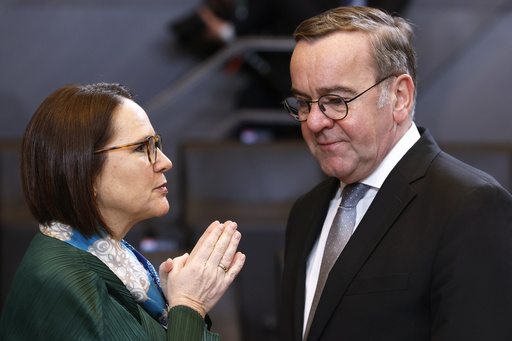
BRUSSELS – On Thursday, various NATO member nations underscored the importance of including Ukraine and European countries in any discussions aimed at achieving peace, amidst U.S. Defense Secretary Pete Hegseth’s assertion that the United States has not abandoned Ukraine.
European officials are expressing concern following indications from the Trump administration regarding potential direct negotiations with Russia over the Ukraine conflict, which could exclude both Kyiv and European allies. The U.S. has suggested that it is up to Europe to ensure security for itself and Ukraine in the face of future Russian actions, while also asserting that Ukraine should not become a member of NATO.
U.K. Defence Secretary John Healey emphasized that Ukraine must be represented in any talks, stating, “There can be no negotiation about Ukraine without Ukraine. And Ukraine’s voice must be at the heart of any talks.” His comments were made during a gathering of NATO defense ministers focusing on the crisis in Ukraine.
German Defense Minister Boris Pistorius echoed this sentiment, clarifying that “it’s clear … that Europe must be involved in the negotiations,” especially as Europe is directly impacted by the outcome and should therefore have a role in establishing the peace framework.
Hegseth responded to allegations of U.S. betrayal of Ukraine regarding ongoing negotiations about its future, affirming that there is no betrayal. “There is a recognition that the whole world and the United States is invested and interested in peace. A negotiated peace,” he stated, dismissing the notion of sidelining Ukraine.
The defense secretary highlighted that the ongoing conflict should serve as a catalyst for NATO members in Europe to increase their defense spending. Although 23 out of 32 NATO member states met the alliance’s spending guideline of 2% of their GDP last year, a significant number have not yet fulfilled this obligation.
However, French Defense Minister Sébastien Lecornu characterized discussions about improving defense expenditures as misguided, noting that European governments are already taking steps to boost military spending and procure additional arms to aid Ukraine in resisting aggression.
Lecornu raised concerns about the viability of NATO’s future, emphasizing that while it holds historical significance as a robust alliance, its relevance may be challenged in the next decade if the U.S. shifts its focus away from European security.
NATO Secretary-General Mark Rutte, who led the meeting, stressed the necessity for any agreement reached between Russia and Ukraine to be enduring, with a clear message to Putin regarding the finality of his territorial ambitions in Ukraine.
Swedish Defense Minister Pål Jonson highlighted Europe’s substantial support for Ukraine, noting that European nations accounted for approximately 60% of military assistance to Kyiv last year, reinforcing the need for Europe’s active participation in security discussions.
Estonian Defense Minister Hanno Pevkur pointed out that the EU has been pivotal in imposing sanctions on Russia and has invested significantly in Ukraine’s defense. Moreover, he argued for the necessity of Europe’s participation in peace negotiations, asserting that without such involvement, the prospects for lasting peace are grim.

